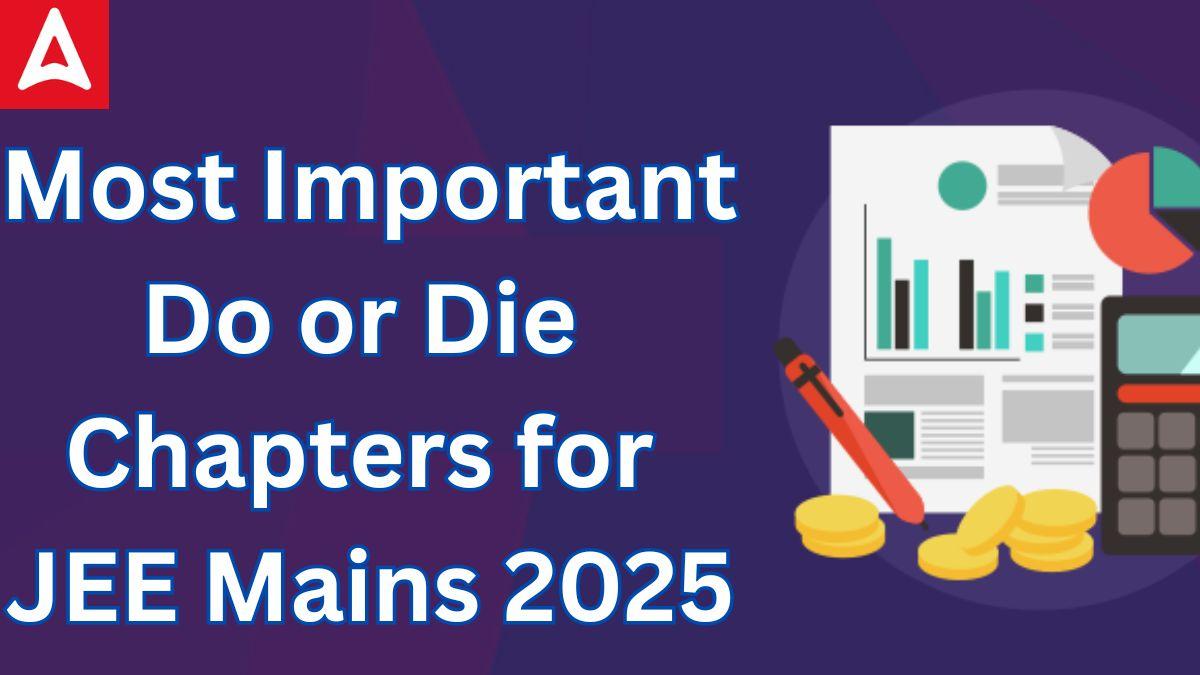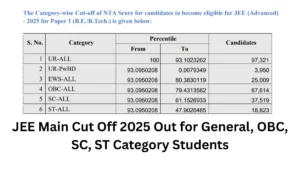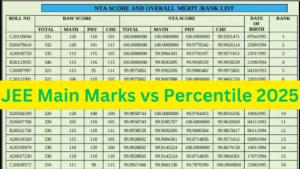Table of Contents
JEE Main is a very challenging exam, and for students to crack it with good marks, they need to be familiar with the most important do or die chapters for JEE Mains 2025. Candidates preparing strategically by putting more focus on such chapters typically achieve high marks in JEE Main in order to gain admission to esteemed engineering institutions.
While preparing for the JEE Main exam, a frequently asked question among students is about the important scoring chapters of this entrance exam. By studying the important do or die chapters for JEE Mains, students will manage to pass the exam with a high score in a shorter duration.
Important Do or Die Chapters for JEE Mains
With limited time remaining for the JEE Main 2025 examination, particularly the session 1 test, it’s crucial to identify the important Do or Die Chapters for JEE Mains 2025. It will assist students in concentrating a significant amount of their time and energy on preparing and reviewing those chapters to boost their overall score.
Candidates preparing for the first session of the Joint Entrance Competitive Exam must be aware of the crucial Do or Die chapters and topics for JEE Main 2025. The JEE Mains session 1 examination for 2025 is scheduled to take place from January 22 to January 30, 2025.
Most Important Do or Die Chapters for JEE Mains 2025
Students must adopt smart strategy and focus more on the important do or die chapters for JEE Main 2025 to stand apart from the crowd and confirm an engineering seat for themselves. Every engineering student’s aim is to rank among the top JEE Mains scorers. Unfortunately, many students find it challenging to cover every topic from all three topics due to the extensive JEE Main syllabus.
We have put together a list of “Most important Do or Die chapters for JEE Mains 2025” that are thought to be the most crucial chapters/topics from the perspective of the test in order to assist candidates with their preparation. The extensive JEE Main 2025 syllabus covers every topic taught in classes 11 and 12, including arithmetic, chemistry, and physics. Starting with the subjects that are most important for JEE Main exam is the best way to prepare for JEE Main 2025 exam.
Most Important Do or Die Chapters and Topics for JEE Main 2025
There are two categories of significant topics for JEE Main 2025: low-weightage and high-weightage topics related to mathematics, physics, and chemistry. Based on suggestions from multiple experts and the JEE Main question papers from the previous year, the analysis presented below was completed. The National Testing Agency (NTA) administers the JEE Main exam each year to candidates seeking admission to India’s SPAs, CFTIs, IIITs, and NITs. For a long, most students thought that studying nonstop was the only way to pass one of the most difficult admission exams in India. That being said, things are changing. The IIT hopefuls of today favor more sophisticated methods of studying and going over the material.
Important Do or Die Topics for JEE Main 2025
It is often seen in the competitive exam of JEE Mains that some topics are asked again and again. Preparing these topics not only aid students in fetching more marks but it also shortens the syllabus giving students more time to study and revise. Candidates can also refer the JEE Main sample questions to have a general understanding of the pattern of the exam. Through significant subjects, applicants can also discover how much weight each chapter carries in the JEE Mains exam.
The JEE Main 2025 exam will be offered in two sessions, in January and April. Being among the top JEE Mains scorers is what every student who wants to be an engineer strives for. Many students find it difficult to cover every topic from all three because of the lengthy JEE Main syllabus. To aid students in getting ready for the test, the most important chapters and subjects for JEE Mains 2025 are emphasized below. Students should concentrate on these subjects in order to get good grades.
Important Do or Die Chapters for JEE Mains 2025 – Weightage
The weightage given to different chapters help students understand the importance of each chapter. Higher the weightage, higher is the importance of that chapter. Knowing the weightage of each chapters, students will not have to deal with a vast syllabus of around 90 chapters, but only have to deal with certain chapters with high weightage frequently. The chapters that carry the highest weight for JEE Mains must be familiar to candidates.
As JEE Main 2025 approaches, candidates should continue to monitor the official JEE website or this page for latest developments. The JEE Mains 2025 syllabus is expected has remained same as the previous year and the NTA has not made any changes to it. The topics from NCERT grades 11 and 12 are included in the Physics, Chemistry, and Mathematics JEE Mains 2025 syllabus. The subject wise important do or die topics is given below.
Most Important Chapters for JEE Mains 2025 in Chemistry (High Weightage)
The following list contains the do or die most important chapters in the Chemistry subject for JEE Mains 2024. This list contains the chapters from both class 11 and class 12.
| Important Do or Die Chapters in Chemistry for JEE Main 2025 |
| Atomic Structure |
| Electrochemistry |
| Gaseous And Liquid State |
| Chemical Kinetics |
| Chemical Bonding |
| Nuclear And Surface Chemistry |
| Co-ordination Compound |
| d-Block Elements |
| Alkyl Halides |
| Aromatic Compounds |
| Thermodynamics |
| Carboxylic Acids And Its Derivatives |
| Aldehydes and Ketones |
| Isomerism |
| General Organic Chemistry |
Important Do or Die Chapters for JEE Mains 2025 in Chemistry (Low Weightage)
Below we have given the details of chapters whose weightage is less in the JEE Main 2025. So, students can plan accordingly and devote proportionate time to these chapters.
| Low Weightage Chapters in Chemistry JEE Main 2025 |
| Metallurgy |
| Solutions |
| Chemical Equilibrium |
| Redox And Volumetric Analysis |
| Qualitative Analysis |
| Biomolecules And Polymers |
| Nitrogen Compounds And Aliphatic Amines |
| Alcohol And Ether |
| Classification And Nomenclature |
| Periodic Classification |
| S-Block Elements |
| Solid State |
| Ionic Equilibrium |
| Mole Concept |
| Hydrocarbons |
Most Important Chapters for JEE Mains 2025 Physics (High Weightage)
Physics is one of the most important subjects for JEE Mains exam. Scoring better marks in this section helps a student in improving his/her rank. The most important chapters for JEE Mains 2025 physics is given below. These chapters belong to the Class 11 and Class 12 syllabus of JEE Main.
| Most Important Chapters And Topics For JEE Main 2025 Physics |
| Electromagnetic Waves |
| Ray Optics |
| Heat And Thermodynamics |
| Semiconductors |
| Wave Optics |
| Gravitation |
| Error And Instrument Analysis |
| Photoelectric Effect |
| Rotation |
| Kinematics |
| Oscillations |
| Electromagnetic Induction And Alternating Current |
| Electrostatics |
| Properties of Matter |
| Current Electricity And Capacitors |
| Magnetic Effects of Current And Magnetism |
| Bohr’s Atomic Model |
Important Do or Die Chapters for JEE Mains 2025 Physics (Low Weightage)
The following lists the chapters and topics in Class 11 and Class 12 Physics that has low weightage in the JEE Main 2025 exam.
| Low Weightage Chapter for JEE Main 2025 Physics |
| Work, Energy And Power |
| Nuclear Physics And X-Rays |
| Fluids |
| Heat Transfer |
| Dual Nature of Matter And Radiation |
| Circular Motion |
| Center of Mass And Collisions |
| Communication Systems |
| Laws of Motion |
Most Important Chapters for JEE Mains 2025 Mathematics (High Weightage)
Mathematics is one of the scoring subjects in the JEE Mains exam. Students preparing for this subject must focus on the high weightage chapters given below.
| Most Scoring Chapters in JEE Mains Maths |
| Sequence And Series |
| Determinant And Matrices |
| Vectors |
| 3 Dimensional Geometry |
| Straight Line |
| Binomial Theorem And M. I. |
| Quadratic Equation |
| Complex Number |
| Conic Sections |
| Application Of Derivatives |
| Functions |
| Limits, Continuity And Differentiability |
| Definite Integral And Area Under the Curve |
| Probability Distribution (Binomial Mean And Variance) |
| Circle |
Important Do or Die Chapters for JEE Mains 2025 Maths (Low Weightage)
The chapters with comparatively low weightage in JEE Main Maths is given below.
| JEE Mains Maths Low Weightage Chapters |
| Indefinite Integral |
| Permutation And Combination |
| Properties of Triangle |
| Trigonometric Ratio And Functions |
| Height And Distance |
| Set And Relation |
| Mathematical Logic |
| Statistics |
| Trigonometric Equation |
| Differentiation |
| Differential Equation |
Which Chapters Can I Skip for JEE Mains 2025
It is advisable not to skip any chapters during the preparation of the JEE Mains exam. Some chapters have low weightage while some have high, so, students should divide their time accordingly. While we have highlighted the key subjects and chapters, it is recommended that students getting ready for the JEE Main Exam 2025 study every topic and chapter in the curriculum for every subject because questions on the exam could come from any chapter. In order to help applicants stay focused and avoid confusion throughout their exam preparation, the key subjects and chapters are supplied.
Important Do or Die Chapters with Weightage
JEE Main is the national-level competitive exam that grants students admission to undergraduate engineering courses in prestigious colleges. It is one of the toughest exams in India. That is why, students must prepare smartly by allocating more time of the important do or die chapters for JEE Mains 2025 exam.
To help students crack this exam with good marks, we have provided students with some of the most important chapters and topics with their weightage for every subject that will help them get into their dream colleges. This weightage is based on the previous year exam papers.
JEE Main Physics Topic-wise Weightage
|
Unit and Topic Name
|
No. of Questions
|
Allocated Marks
|
Weightage (in %)
|
|
Physics
|
27
|
108
|
90.00%
|
|
Class-12
|
14
|
56
|
46.67%
|
|
Current Electricity
|
3
|
12
|
10.00%
|
|
Combination of resistance and Combination of Cells
|
1
|
4
|
3.33%
|
|
Current in conductor, Definition of Current, Current Densities and Drift Velocities
|
1
|
4
|
3.33%
|
|
Voltmeter, ammeter, galvanometer
|
1
|
4
|
3.33%
|
|
Electrostatics
|
1
|
4
|
3.33%
|
|
Coulomb’s Law
|
1
|
4
|
3.33%
|
|
Geometrical Optics
|
1
|
4
|
3.33%
|
|
Combination of Lenses/Lens and Mirrors
|
1
|
4
|
3.33%
|
|
Gravitation
|
1
|
4
|
3.33%
|
|
Acceleration due to Gravity (g)
|
1
|
4
|
3.33%
|
|
Modern Physics-1
|
2
|
8
|
6.67%
|
|
Bohr’s Theory for Hydrogen, Hydrogen Like Atoms (Properties), Electronic Transition In The H/H-Like Atom / Species and Effect of Motion of Nucleus
|
1
|
4
|
3.33%
|
|
De-Broglie Wave, Uncertainty principle & Davison Germar exp.
|
1
|
4
|
3.33%
|
|
Modern Physics-2 (Nuclear Physics)
|
1
|
4
|
3.33%
|
|
Nucleus & Nucleus stability (Mass defect, BE, alpha, beta decay
|
1
|
4
|
3.33%
|
|
Semi Conductor
|
1
|
4
|
3.33%
|
|
Special Diode
|
1
|
4
|
3.33%
|
|
Alternating Current
|
1
|
4
|
3.33%
|
|
AC Source With RLC, RC, RL Connected In Series
|
1
|
4
|
3.33%
|
|
Capacitor
|
1
|
4
|
3.33%
|
|
Circuits With Capacitor and Use of KCL and KVL, Combination of Capacitors
|
1
|
4
|
3.33%
|
|
Wave Optics (Light waves – Youngs experiment)
|
1
|
4
|
3.33%
|
|
Diffraction & Polarisation
|
1
|
4
|
3.33%
|
|
Magnetic Field
|
1
|
4
|
3.33%
|
|
Magnetic Field Due To Ring, Circular, Arc & Combination of various shapes
|
1
|
4
|
3.33%
|
|
Class-11
|
13
|
52
|
43.33%
|
|
Elasticity
|
1
|
4
|
3.33%
|
|
Elasticity, Elastic Behaviour, Young Modulus
|
1
|
4
|
3.33%
|
|
KTG and 1st Law of Thermodynamics
|
2
|
8
|
6.67%
|
|
First law Thermodynamics & Specific heat in Different process
|
1
|
4
|
3.33%
|
|
Calculation of work in different Thermodynamics Process
|
1
|
4
|
3.33%
|
|
System of particles, Centre of Mass, Momentum and Collision
|
3
|
12
|
10.00%
|
|
Conservation of Momentum
|
1
|
4
|
3.33%
|
|
Calculation of Centre of Mass
|
2
|
8
|
6.67%
|
|
Unit and Dimension
|
1
|
4
|
3.33%
|
|
Dimensional Analysis
|
1
|
4
|
3.33%
|
|
Friction
|
1
|
4
|
3.33%
|
|
Block Problems (Two & More than Two Blocks and extra problems)
|
1
|
4
|
3.33%
|
|
Sound Waves
|
1
|
4
|
3.33%
|
|
Beats & Doppler Effects
|
1
|
4
|
3.33%
|
|
Circular Motion
|
1
|
4
|
3.33%
|
|
Circular Motion in Horizontal Plane
|
1
|
4
|
3.33%
|
|
Rectilinear Motion
|
1
|
4
|
3.33%
|
|
Definition related problems (distance, displacement, average velocity, average speed, instantaneous velocity, instantaneous speed, average acceleration and instantaneous acceleration)
|
1
|
4
|
3.33%
|
|
Error and Measurement
|
2
|
8
|
6.67%
|
|
Error Definition & Types of Errors
|
1
|
4
|
3.33%
|
|
Varnier’s Callipers
|
1
|
4
|
3.33%
|
JEE Main Topic-wise Weightage Chemistry
|
Unit and Topic Name
|
No. of Questions
|
Allocated Marks
|
Weightage (in %)
|
|
Chemistry
|
27
|
108
|
90%
|
|
Physical Chemistry
|
9
|
36
|
30.00%
|
|
Class – 12
|
26
|
8
|
6.67%
|
|
Electrochemistry
|
1
|
4
|
3.33%
|
|
Application Of Nernst Equation In Different Type Of Electrodes And Cells
|
1
|
4
|
3.33%
|
|
Solution Colligative Properites
|
1
|
4
|
3.33%
|
|
Degree of lonisation / Dissociation For Weak Electrolytes
|
1
|
4
|
3.33%
|
|
Class – 11
|
7
|
28
|
23.33%
|
|
Atomic Structure
|
2
|
8
|
6.6
|
|
Calculation Related To Nucleus
|
1
|
4
|
3.33%
|
|
De Broglie Wavelength And Uncertainty Principle
|
1
|
4
|
3.33%
|
|
Mole concept
|
3
|
12
|
10.00%
|
|
Stoichiometry , Equation Based Calculations ( Elementary Level Single
Equation Or 2 )
|
1
|
4
|
3.33%
|
|
Balancing Redox Reactions
|
2
|
8
|
6.67%
|
|
Ionic Equilibrium
|
1
|
4
|
3.33%
|
|
Salt hydrolysis , pH calculation Solutions of salt of monoprotic acid and
monoacidic base
|
1
|
4
|
3.33%
|
|
Thermodynamics
|
1
|
4
|
3.33%
|
|
Adiabatic And Isothermal Processes
|
1
|
4
|
3.33%
|
|
Inorganic Chemistry
|
8
|
32
|
26.67%
|
|
Class – 12
|
2
|
8
|
6.67%
|
|
Coordination Compound
|
2
|
8
|
6.67%
|
|
Valence Bond Theory + Crystal Field Theory ( Part – I )
|
1
|
4
|
3.33%
|
|
General Introduction Of Complex Salts And Definitions To Be Used
|
1
|
4
|
3.33%
|
|
Class – 11
|
6
|
24
|
20.00%
|
|
Chemical Bonding
|
5
|
20
|
16.67%
|
|
Vsepr Theory
|
1
|
4
|
3.33%
|
|
Fajan’s Rule And Its Applications
|
1
|
4
|
3.33%
|
|
Applications Of H – Bond
|
1
|
4
|
3.33%
|
|
Acidic and basic character
|
1
|
4
|
3.33%
|
|
Types Of Chemical Bond And Octet Rule
|
1
|
4
|
3.33%
|
|
Periodic Table Periodicity
|
1
|
4
|
3.33%
|
|
Atomic And lonic Radius
|
1
|
4
|
3.33%
|
|
Organic Chemistry
|
10
|
40
|
33.33%
|
|
Class -12
|
8
|
32
|
26.67%
|
|
Biomolecule and Polymer
|
1
|
4
|
3.33%
|
|
Nucleic Acids and Lipids
|
1
|
4 |
3.33%
|
|
Haloalkane & Haloarenes
|
1
|
4 |
3.33%
|
|
Introduction to reaction Mechanism
|
1
|
4
|
3.33%
|
|
Aromatic Compounds (Benzene, Aryl halide, Phenol, Amines & Diazonium salt )
|
4
|
16
|
13.33%
|
|
Aromatic Compounds (Benzene ,Aryl Halide ,Phenol ,Amines And Diazonium Salt )
|
1
|
4 |
3.33%
|
|
Electrophilic Aromatic Substitution
|
3
|
12
|
10.00%
|
|
Streoisomerism
|
1
|
4
|
3.33%
|
|
Calculation of Number of Stereoisomers
|
1
|
4
|
3.33%
|
|
Oxidation &Hydrolysis of Organic
|
1
|
4
|
3.33%
|
|
Reduction
|
1
|
4
|
3.33%
|
|
Class -11
|
2
|
8
|
6.67%
|
|
IUPAC &Structural Isomerism
|
1
|
4
|
3.33%
|
|
IUPAC -Nomenclature Of Functional Groups (Sulfonyl ,Ketone ,Hydroxyl ,Amine Group Etc. )
|
1
|
4
|
3.33%
|
|
Structural Identification
|
1
|
4
|
3.33%
|
|
Elements detection and Chromatography
|
1
|
4
|
3.33%
|
JEE Mains Math Topic-wise Weightage
|
Unit and Topic Name
|
No. of Questions
|
Allocated Marks
|
Weightage (in %)
|
|
Maths
|
20
|
80
|
66.67%
|
|
Class-12
|
13
|
52
|
43.33%
|
|
Application of Derivatives
|
1
|
4
|
3.33%
|
|
MONOTONICITY (INTERVALS OF MONOTONICITY)
|
1
|
4
|
3.33%
|
|
Definite Integration
|
3
|
12
|
10.00%
|
|
Properties of Definite Integration (Property V-VI (Five and six) (king rule))
|
1
|
4
|
3.33%
|
|
Properties of Definite Integration (Property IV (Even odd function))
|
1
|
4
|
3.33%
|
|
Application of Definite Integration as Area Under Curve (Area of Curve with a Straight Line)
|
1
|
4
|
3.33%
|
|
Differential Equation
|
2
|
8
|
6.67%
|
|
Method of Solving Differential Equation (Integrating Factor Method (linear Differential Equation))
|
1
|
4
|
3,33%
|
|
Method of Solving Differential Equation (Reducible to integrating factor (Bernaull’s equation))
|
1
|
4
|
3.33%
|
|
MATRICES
|
1
|
4
|
3,33%
|
|
Determinant of Square Matrix (Determinant of Square matrix )
|
1
|
4
|
3.33%
|
|
Probability
|
1
|
4
|
3.33%
|
|
Total Probability Theorem (Baye’s Theorem)
|
1
|
4
|
3.33%
|
|
Relation Function ITF
|
1
|
4
|
3.33%
|
|
Relation and Its Type (Number of Relations)
|
1
|
4
|
3.33%
|
|
Three Dimensional Geometry
|
1
|
4
|
3.33%
|
|
Line(Shortest Distance Between Lines )
|
1
|
4
|
3.33%
|
|
Vector
|
1
|
4
|
3.33%
|
|
Vector Triple Product(Vector Triple Product)
|
1
|
4
|
3.33%
|
|
Limit Continuity and Derivability
|
2
|
8
|
6.67%
|
|
Derivability (Derivability in interval)
|
1
|
4
|
3.33%
|
|
Methods of Evaluation of Limits (By Substitution)
|
1
|
4
|
3.33%
|
|
Class-11
|
7
|
28
|
23.33%
|
|
Circle
|
1
|
4
|
3.33%
|
|
Interaction between two Circles (Common tangent from Circle to circle)
|
1
|
4
|
3.33%
|
|
Conic Section
|
1
|
4
|
3.33%
|
|
Permutation and Combination
|
2
|
8
|
6.67%
|
|
Grouping Theory (Equal + Unequal Grouping )
|
1
|
4
|
3.33%
|
|
Method of Fictitious Partition (Non-Negative Integral Solution)
|
1
|
4
|
3.33%
|
|
Sequence and Series
|
2
|
8
|
6.67%
|
|
Arithmetic Progression (General Term of AP)
|
1
|
4
|
3.33%
|
|
Arithmetic Progression (Arithmetic Mean)
|
1
|
4
|
3.33%
|
|
Quadratic Equation
|
1
|
4
|
3.33%
|
|
Basic of Quadratic (Quadratic Equation)
|
1
|
4
|
3.33%
|
Most Important Do or Die Chapters and Topics for JEE Mains 2025: Preparation Tips
Those who want to pass the JEE Main 2025 must plan their studies carefully. Despite the exam’s difficulty, it is passable with the right time management strategies. Some of the top JEE Main 2025 preparing techniques are given hereunder.
- The Joint Entrance Exam is a very competitive test that requires a great deal of planning, self-control, medicines, dedication, and self-control.
- For advice, candidates might enroll in a reputable coaching center.
- It’s crucial to complete as many practice tests and previous year’s questions as you can. It will help you understand things better and gain the much-needed confidence.
- In order to prepare for arithmetic, practice is crucial. As much as you can, solve.
- Candidates need to be quite knowledgeable about the JEE Main 2025 syllabus.
| Related Article | |
| JEE Mains Exam 2025 | JEE Main Latest Exam Pattern |
| JEE Main Syllabus 2025 | JEE Main Marking Scheme |
| JEE Mains Percentile Predictor | JEE Main Preparation Strategy |





 JoSAA Counselling 2025 To Begin in June,...
JoSAA Counselling 2025 To Begin in June,...
 JEE Main Cut Off 2025 Out for General, O...
JEE Main Cut Off 2025 Out for General, O...
 NTA JEE Mains 2025 Marks vs Percentile S...
NTA JEE Mains 2025 Marks vs Percentile S...










